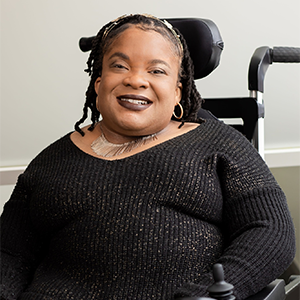La Salle University
Discussing and supporting students and young people with disabilities

A resource center dedicated to autism and developmental disabilities support organized two campus events, including a talk on creating inclusive learning spaces.
April is Autism Awareness Month. This year, the La Salle Autism and Developmental Disabilities Education Resources (LADDER) Family Center organized events to call attention to this important month and the significance of providing support to students and young people with disabilities, as well as their families.
LADDER coordinated a Walk for Autism Awareness on April 20, followed by a speaker series event on April 25 in the Student Union’s Dunleavy Room to share more on creating inclusive learning spaces. Guest speaker Angel Miles, Ph.D., is a graduate of neighboring Widener Memorial School and an advocate for the disabled community.

We spoke with Miles about her work and her April talk on La Salle’s campus.
For those who weren’t able to attend your talk—tell us a little about what topics you covered?
Miles: I discuss[ed] ableism and its intersections with other systems of difference and inequality such as race, class, and gender. I discuss[ed] the difference between disability justice and disability rights, and the role that special education and higher education has in eliminating all forms of social injustice that impede people with disabilities from fully participating in society. By telling my story, I will share examples of the barriers that multiple marginalized people with disabilities face when pursuing their education and what it takes to manage, eliminate, and transcend those barriers with supports.
How did you hear about La Salle’s Spring Ladder Speaker Series?
Miles: Jim Scanlon (LADDER’s associate director) informed me of the program. He was my swim teacher at Widener Memorial School in the 1990s and we have stayed in touch.
When I learned of the goals and aims of LADDER, I wanted to be a part of helping to educate and support students who were like me and the families, students, and teachers who support them.
Why is it important for communities to be informed about programs that enhance the quality of life for students from elementary school through college and their families living with autism spectrum disorder, neurodivergence, developmental disabilities, and movement diversity?
Miles: Disability is a natural part of the spectrum of human difference. One in four adults in America has a disability, representing 26% of the population. This makes people with disabilities the largest minority group in the country. If you live long enough, everyone will eventually have or be connected to someone who has a disability. We cannot afford to have a society that excludes and fails to meet the needs of such a large segment of its population, a group in which everyone will eventually be a part of in some way or form. But more than that, people with disabilities are human beings that deserve equitable access to resources and opportunities as a human right.
How can we as a society do more to support those with autism spectrum disorder, neurodivergence, developmental disabilities, and movement diversity?
Miles: Society misses out on the diversity of our talents, our gifts, and our world views every time we are not given the tools we need to survive and thrive in a world that was not primarily built with us in mind. I am convinced that the solutions to some of society’s most pressing problems rest in the minds and bodies of disabled people themselves. When we provide fair, equitable, and unbiased opportunities for people with disabilities in all of our diversity to exist as we are in the world, everyone benefits. We can accomplish this by listening to, learning from, partnering with and prioritizing leadership of members of the disability community. Nothing about us without us must continue to be a central value when it comes to any issue involving disabled people if we are to be fully included in society.
You have long advocated for the disabled community. What motivates you?
Miles: I became a professional disability and social justice advocate not because I wanted to or was initially trained to be, but because I had to in order to survive. I simply learned at an early age that there was no other way that I was going to have my needs met and be able to equitably access the resources and opportunities of my nondisabled, white, and/or male peers unless I advocated for myself, and others like me. Otherwise, I found that I was being ignored, excluded, and blatantly discriminated against at every turn. Learning about the disability rights movement, disability studies as a field, and other movements and theories on social justice helped empower me to resist people, systems, and ideologies which suggested that I did not belong or was somehow inferior to others. It inspired me to do my part to make society a more equitable place so that no one else has to encounter the barriers I did and so that everyone has the opportunity to reach their potential, aim higher, and do more than what is typically expected of people with disabilities and other marginalized people in a deeply ableist and oppressive society.
— Meg Ryan